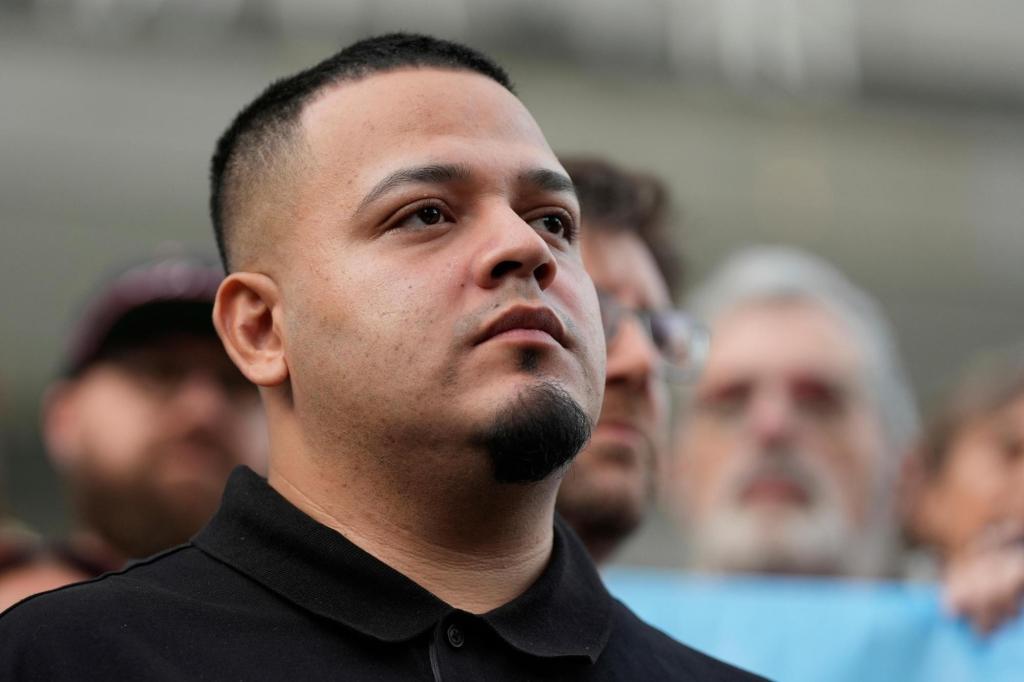
GREENBELT, Md. (AP) — A federal judge in Maryland on Monday sought assurances that the government will not deport Kilmar Abrego Garcia before she has lifted an injunction barring his removal from the U.S.
Immigration and Customs Enforcement filed a notice late last week of their plan to deport him to the West African nation of Liberia as early as Friday. It’s the latest in a series of African countries the agency has designated as possible destinations for the Salvadoran national.
Abrego Garcia has an American wife and child and has lived in Maryland for years, but he immigrated to the U.S. illegally as a teenager. In 2019, an immigration judge granted him protection from being deported back to El Salvador, where he faces a “well-founded fear” of violence from a gang that targeted his family. Earlier this year, his mistaken deportation to El Salvador, where he was held in a notoriously brutal prison despite having no criminal record, galvanized opposition to President Donald Trump’s immigration crackdown. Facing mounting public pressure and a court order, the Trump administration brought him back to the U.S. in June.
During a status conference on Monday, U.S. District Judge Paula Xinis questioned why the government does not simply deport Abrego Garcia to Costa Rica — a country he has said he is willing to go to because the government has promised he would welcomed as a legal immigrant and not re-deported to El Salvador.
“Any insight you can shed on why we’re continuing this hearing when you could deport him to a third country tomorrow?” Xinis asked government attorneys. She noted that both the government and Abrego Garcia were “about to burn significant resources” in fighting over whether he can legally be deported to Liberia.
Government attorneys, including Deputy Assistant Attorney General Drew C Ensign and Deputy Assistant Attorney General Jonathan Guynn, didn’t immediately have an answer but suggested it could be part of an upcoming court filing.
In the meantime, the attorneys said ICE is preparing to interview Abrego Garcia after he filed an official notice expressing fear of deportation to Liberia. His attorney, Simon Sandoval-Moshenberg, told the judge they have received some confidential documents pertaining to assurances from the Liberian government about how Abrego Garcia would be treated there. However, they are not satisfied by what they have received. He hinted that the Liberian government has only agreed to take Abrego Garcia for a limited time.
The administration’s deportation agreements with so-called third countries have been contested in court by advocacy groups, who have argued that they violate due process rights and that immigrants are being sent to countries with long histories of human rights violations. But in June, a divided Supreme Court allowed the swift removal of immigrants to countries other than their homelands and with minimal notice.
When Abrego Garcia was returned to the U.S. in June, he was charged in Tennessee with human smuggling. He has pleaded not guilty and asked the judge to dismiss that case. A hearing on the motion to dismiss is set for next week, and Xinis noted the fact that the government seems ready to deport him just prior to that, saying his removal would be the end of the criminal case.
“It doesn’t pass the sniff test that there hasn’t been some coordination” Xinis said, noting that the hearing in the criminal case was “common knowledge.”
“If I don’t lift the injunction, you are abiding by it, and he’s not going to be removed? Is that right?” she asked the government attorneys. They agreed.
In a separate action in immigration court, Abrego Garcia has applied for asylum in the United States.



